Proceeds injected into the Greek State’s coffers from penalties imposed for illicit fuel trade amounted to 11.2 million euros between 2015 and 2017, representing just 1.1 percent of a one-billion sum previously pledged by the current government.
The disappointing data, which highlights the anemic effort, at best, being made by local authorities to combat a gigantic problem depriving the Greek State of billions in state revenues, was recently presented in parliament following a question raised by main opposition New Democracy party MP Hristos Staikouras.
In 2013, state revenues stemming from penalties imposed for fuel trade violations reached 15.5 million euros before sliding to 11.4 million euros in 2014, 4.4 million euros in 2015, 3.7 million euros in 2016, and 3.1 million euros in the first nine-month period of 2017.
Fuel smugglers have taken full advantage of this extended period of slackened monitoring to increase their level of illicit trading activity by discovering new market niches, including in the auto LNG market, and fine-tuning their ways.
A much-heralded cash inflow-outflow monitoring system installed at all petrol stations since 2014 and estimated to have cost 100 million euros has proven futile as its resulting data, imported into the finance ministry’s information system, is not being utilized.
Little progress is believed to have been made in implementing another monitoring system requiring fuel trucks and the country’s thirty or so tankers to be installed wth GPS systems. Legislation for this measure was ratified in 2012. It was followed by a ministerial decision, signed by several ministers last August, which set an October 31, 2017 deadline for the installation of GPS systems by all fuel trucks and vessels. The number of trucks and vessels that have complied with the measure remains unclear.
Just days ago, a joint ministerial decision signed by energy minister Giorgos Stathakis and deputy finance minister Giorgos Houliarakis, reinstated bonus payments for officials at KEDAK, a fuel handling and storage controls authority. These bonuses were scrapped in early 2016 as part of the wider bailout-related cuts. The initiative to bring them back suggests that inspections for illicit fuel trade can be expected only when authorities are offered bonus fees. Whether this bonus-fees initiave can produce results, depite the lax enforcement of all the aforementioned measures, remains to be seen.





